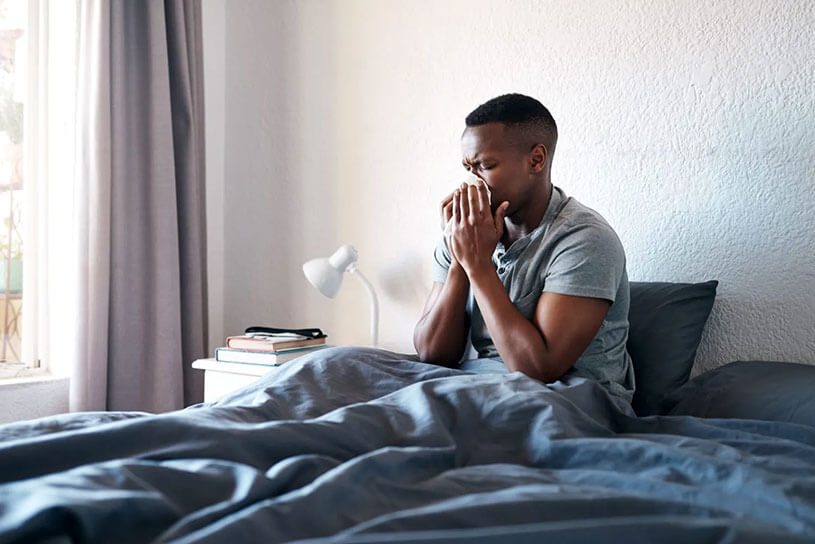Whether you get self-employed sick pay depends on the legal structure of your business. If you’re not entitled to Statutory Sick Pay (SSP), there are other sickness benefits that you could be entitled to.
- can I get sick pay when self-employed?
- sick pay for self-employed limited company directors
- sick pay for self-employed sole traders and partners
Can I get sick pay when self-employed?
In most cases, the self-employed are unable to claim for many of the benefits that employees are entitled to – including statutory sick pay (SSP).
SSP is a payment to employees when they’re off sick for an extended period of time.
As self-employed insurance doesn’t offer protection for sickness and ill health, it’s worth looking into whether you can claim SSP. Self-employed eligibility for SSP depends on the legal structure of a business.
That’s because if you’re a limited company director you’re an employee of your limited company. This means you’re entitled to SPP at the same rates as your employees.
If you’re a sole trader or in a partnership you can’t claim SSP, but there are other self-employed sickness benefits that you might be able to claim for.
Sick pay for self-employed limited company directors
Limited company directors are employees, so they can claim SSP through their business.
The usual SSP rate applies. In 2024-25 the SSP rate is £116.75 a week for up to 28 weeks.
If you’re off work sick as a limited company director, you need to follow the SSP rules. You have to have been off work for four or more days in a row, including non-working days. Days when you’re meant to be working but are off sick are known as ‘qualifying days’.
The first three days you’re sick are known as ‘waiting days’. You’re entitled to SSP from the fourth day you’re off sick.
You need to earn an average salary of at least £123 a week to qualify for SSP.
Sick pay for for self-employed sole traders and partners
While sole traders and partners can’t claim SSP, there’s a number of benefits the self-employed might be entitled to.
The one that could cover self-employed illness is Employment and Support Allowance (ESA). You might be entitled to weekly ESA payments if you have a longer-term illness or disability that means you’re unable to work.
You also need to be:
- 16 or over
- under the State Pension age
- live in England, Wales or Scotland
- not claiming Job Seekers’ Allowance (JSA)
- paying enough National Insurance contributions (check your National Insurance record at gov.uk)
While there are different types of ESA that people can claim for, most will claim ‘new style’ ESA. For this, you need to have been an employee or self-employed over the last two to three years. You also need to have two full tax years of National Insurance contributions (or one year of contributions and one year of National Insurance credits).
You can apply for ‘new style’ ESA online at gov.uk or over the phone. You need your:
- proof that you have limited capability for work (fit note)
- National Insurance number
- bank or building society account number and sort code
- GP’s details
- income details if you’re working
Citizens Advice says that the Department for Work and Pensions (DWP) might tell you that you should claim for self-employed Universal Credit too, but you don’t need to do this for ‘new style’ ESA. You shouldn’t feel pressured to apply for benefits you’re not sure about.
Sick pay for self-employed rates when claiming ESA
Citizens Advice says that if the DWP accepts your claim, you’ll get your first payments a few weeks after your claim. Your payments will usually be backdated by up to three months, to cover time when you had limited capability to work. You won’t be able to claim payments for the first seven days you were unable to work.
When you first claim for ‘new style’ ESA or contribution-based ESA, you’ll usually get:
- £90.50 each week (aged 25 or over)
- £71.70 each week (aged under 25)
After three months, the DWP will assess you. You’ll then be put into one of two groups. If you’re able to get back into work in the future, you’ll be put into something called the work-related activity group. Otherwise, you’ll be put into the support group.
Each group has a different rate:
- up to £90.50 a week (if you’re able to go back to work and put in the work-related activity group)
- up to £138.20 a week (if you’re not able to go back to work and put in the support group)
If you’re in the support group and on income-related ESA, you’re also entitled to the enhanced disability premium, and may qualify for the severe disability premium. You may also qualify for the severe disability premium – you’re able to claim both at the same time.
Guides for small business owners
- What is Statutory Sick Pay (SSP) and the SSP rate?
- Self-employed benefits entitlement: what you should know
- A guide to VAT for small businesses
- Insurance for self-employed people
- What type of business insurance do I need?
What do you think about self-employed sick pay? Should the self-employed get more support? Let us know in the comments below.
Is your business insured?
We have over 800,000 customers plus a 9/10 satisfaction score. Why not take a look at our expert business insurance options – including public liability insurance and professional indemnity – and run a quick quote to get started?
